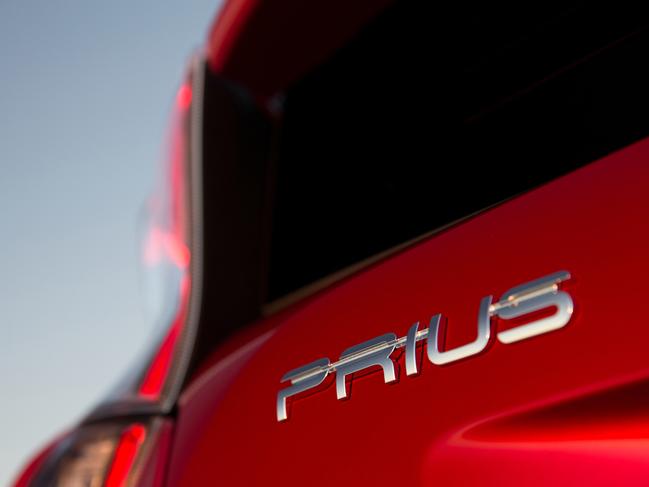Toyota’s Prius pays price for cheap fuel
Once a darling of the environmentally conscious, Toyota’s hybrid is struggling in the US as petrol prices plunge.
Toyota’s latest Prius hybrid has a problem: fuel prices.
When the Prius first went on the US market in the late 1990s, it was a hit among celebrities like actor Leonardo DiCaprio who flaunted their environmental bona fides with the hybrid gas-electric car.
The latest version, which hit roads in December last year, is more fuel-efficient than ever, getting 54 miles to the gallon (23km per litre). In Toyota’s home market of Japan, it tops the sales charts. But it is struggling in the US as relatively cheap fuel prices dent the car maker’s strategy of presenting itself as the leader of an environmentally-friendly future — with the Prius as the vanguard.
US sales of the Prius are down 26 per cent this year through August.
At Longo Toyota in El Monte, California, the largest Toyota dealership in the US by volume, Prius sales have fallen by 11 per cent compared with last year. “But that’s not because of the car,” said Brendan Harrington, Longo Toyota’s president. “The entire market has dramatically shifted to light trucks and SUVs with gas under $US3 a gallon.”
Americans are now more likely to trade in a hybrid or an electric vehicle for an SUV than they are another hybrid or electric vehicle, according a survey conducted by automotive research firm Edmunds in April.
“There is a direct correlation in the price of gasoline and the interest of consumers in hybrids,” said Brian Maas, head of the California New Car Dealers Association, which represents over 1000 dealers in the biggest US market for the Prius. “When gas was at $US4, the Prius was No. 1. Gas is at $US2.50,” Mr. Maas said.
It is especially frustrating for Toyota because its strategy is generally a success in Japan. Through August, the new Prius and a smaller related model — called Aqua in Japan and the Prius c in the US — sold 304,000 units in Japan, tops in the nation and three times the US sales even though the US car market is far bigger.
One reason is higher gasoline taxes, which make the price of a gallon of gas in Japan around $US4.50.
“The sense of value is different in the US and Japan toward eco-friendly cars,” said Hisashi Nakai, the head of Toyota’s technology communications group. In the US, people want larger cars because they drive more, he said, while in Japan, “hybrids sell well regardless of the gas prices.”
Despite fuel efficiency improvements and reduced hybrid system costs, global Toyota hybrid sales are slowing after having peaked at around 1.3 million units in 2013.

Toyota’s US August sales were down 5 per cent in a month where rivals General Motors Co. and Ford Motor Co. saw their sales fall more sharply.
Toyota isn’t the only manufacturer facing difficulties selling hybrids in the US. Sales for the vehicles are down 14.4 per cent for the year, according to Hybridcars.com and market-research firm Baum and Associates.
Still, even accounting for the overall decline in the market, Prius sales are sputtering in the US. Sales of the flagship Prius sedan are down 9.6 per cent for the year, compared with a 50 per cent decline for the seven-seater Prius v and a 45 per cent decline in sales for the Prius c.
Toyota is trying to compensate for the shift in consumer tastes by selling more pick-up trucks, but the factories that produce those vehicles are running out of space. The company builds Tacoma and Tundra trucks at factories in San Antonio, Texas, and Baja California in Mexico. “The San Antonio factory is the most capacity-constrained Toyota factory in the world,” said Christopher Richter, a Tokyo-based auto analyst at CLSA.
Toyota’s Mr Nakai said the company believes that eventually Americans will want to buy the same cars as its Japanese customers, pointing to US government efforts to tighten fuel emissions standards.
But even in Japan, fuel efficiency alone isn’t enough to move cars off the lot anymore.
Despite the Prius’ position in Japan, “our honest feeling is that it could have sold better,” said Yasutomo Kato, head of new car sales promotion at Toyota dealer Tokyo Toyopet. It wasn’t until Toyopet focused its Prius sales pitch on new safety technologies like automatic braking and collision warning sensors that buying started to pick up, Mr Kato said.
Toyota is partly a victim of its own success. These days there are plenty of hybrids and other environmentally friendly cars, including all-electric models from Tesla Motors. Toyota sells a hybrid Camry and RAV 4 SUV, and for those who want to show off the latest technology it has the hydrogen fuel cell-powered Mirai sedan.
Despite last year’s redesign which gave the Prius a sportier profile — Toyota calls the car “daring” and “edgy” in its brochure — some say it is starting to look a little dated.
“The Prius is a great concept, but Toyota has really put more energy in to the mechanics of the hybrid vehicle rather than the styling,” said Chris Redl, who runs the Japan-focused fund Siena Carnico Capital.
“The people with money buy a Tesla.”
Dow Jones



To join the conversation, please log in. Don't have an account? Register
Join the conversation, you are commenting as Logout